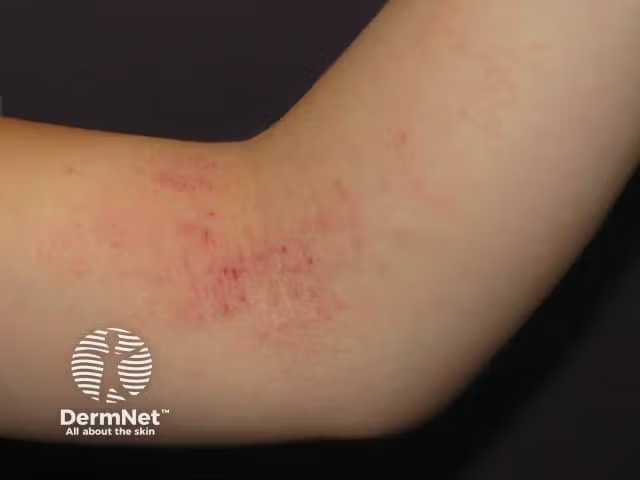- Case-Based Roundtable
- General Dermatology
- Eczema
- Chronic Hand Eczema
- Alopecia
- Aesthetics
- Vitiligo
- COVID-19
- Actinic Keratosis
- Precision Medicine and Biologics
- Rare Disease
- Wound Care
- Rosacea
- Psoriasis
- Psoriatic Arthritis
- Atopic Dermatitis
- Melasma
- NP and PA
- Skin Cancer
- Hidradenitis Suppurativa
- Drug Watch
- Pigmentary Disorders
- Acne
- Pediatric Dermatology
- Practice Management
- Prurigo Nodularis
- Buy-and-Bill
Publication
Article
Dermatology Times
Refocusing on Venous Thromboembolism and Chronic Inflammatory Skin Diseases
Author(s):
Patients with chronic inflammatory skin diseases do not have an increased risk of venous thromboembolism (VTE) compared to a matched healthy control cohort. This knowledge can be useful to clinicians when contemplating systemic immunomodulatory therapies in their dermatologic patients.
New study findings show that patients with chronic inflammatory skin diseases including psoriasis, atopic dermatitis (AD), alopecia areata (AA), vitiligo, an,hidradenitis suppurativa (HS) do not have an increased risk of venous thromboembolism (VTE) compared to healthy individuals without these dermatologic diseases. This data is important for dermatologists who are assessing treating patients with systemic immunomodulatory agents known to modulate VTE such as corticosteroids as well as the newly FDA-approved Janus kinase (JAK) inhibitors.
Clincians should be aware that VTE is a common and potentially serious risk in patients with chronic inflammatory diseases such as rheumatoid arthritis (RA) and inflammatory bowel disease (IBD), both of which have increased inherent risk for developing VTE in these patient populations.
However, data on the risk of VTE in patients with chronic inflammatory skin diseases are mixed. Establishing a robust estimate of the background VTE risk in this patient population is critical to the treatment and management plans with new system immunomodulatory medications such as the JAK inhibitors.
“For a long time, it has been thought that patients with RA and IBD have a higher inflammatory burden than patients with chronic inflammatory skin diseases. As such, patients with dermatologic conditions may not have the same baseline increased risk and therefore may not have the same increased risk for TVE compared to these patients who have this higher inflammatory burden from their IBD and RA disease,” said Maria Schneeweiss, MD.
She is an instructor in medicine, Division of Pharmacoepidemiology and Pharmacoeconomics in the Department of Medicine at Brigham and Women's Hospital, Harvard Medical School, Boston, Massachusetts, and lead author of the study.
Schneeweiss and fellow colleagues recently conducted a study to assess the risk of VTE in patients with and without chronic inflammatory skin disease, evaluating patients from a US healthcare database (Optum’s deidentified Clinformatics Data Mart Database) from 2004-2019.1
A total of 158,123 patients with dermatologist-recorded psoriasis (n=96,138), AA (n=17,889), AD (n=30,418), vitiligo (n=7,735), or HS (n=5,934), and 9 patients having two of these conditions, were identified and compared to a healthy control cohort of 1,570,387 patients without a chronic inflammatory skin disease. The incidence rate (per 1000 person-years) of outpatient or inpatient VTE for AD, HS, psoriasis, AA, and vitiligo was 1.83, 1.65, 1.57, 0.94, and 0.93, respectively.
Results showed the incidence rate to be 1.53 in chronic inflammatory skin disease overall, compared to 1.76 in patients without a chronic inflammatory skin disease.
Knowing the background risk and rate of VTE in the specific dermatologic conditions being looked at can indicate early if a VTE signal is seen among patients who are using these new systemic immunomodulatory drugs like the JAK inhibitors. According to Schneeweiss, this allows clinicians to contextualize and discern whether it is due to the medication or the inherent increased risk attributable to the skin disease.
“In RA, we know that studies have been done showing that RA patients have a baseline increased risk of VTE. We did not find that in the dermatologic conditions studied. That will help us to contextualize if we see a signal with the JAK inhibitors, which may prove important to optimal treatment planning,” Schneeweiss said.
That's especially noteworthy as an increasing number of new systemic immunomodulatory agents for the treatment of dermatologic conditions, including JAK inhibitors for AD, AA, and vitiligo, will likely be marketed in the near future.
Many patients may also have overlapping dermatologic conditions or also have some other chronic inflammatory diseases, such as IBD and psoriasis.
Although the study revealed no risk inherent to the chronic inflammatory skin diseases, VTE remains a very important potential adverse event to be monitored going forward. There are many different factors to be considered when contemplating ideal therapy and, according to Schneeweiss, the treatment regimen must be specific to the individual patient's case.
“When looking at potential systemic immunomodulatory therapies, including the JAK inhibitors, going forward, I think the treatment and management will be very specific to the patient," said Schneeweiss. "It will be a discussion between the patient and the provider, putting into context other risks that we know may raise the risk of VTE. However, when factoring the chronic inflammatory skin conditions into that equation, the risk for VTE does not appear to be high."
Disclosures
Schneeweiss reported no relevant conflicts of interest.
Reference
1. Schneeweiss MC, Kim SC, Wyss R, Jin Y, et al. Incidence of venous thromboembolism in patients with dermatologist-diagnosed chronic inflammatory skin diseases. JAMA Dermatol.2021 Jul 1;157(7):805-816. doi: 10.1001/jamadermatol.2021.1570.







